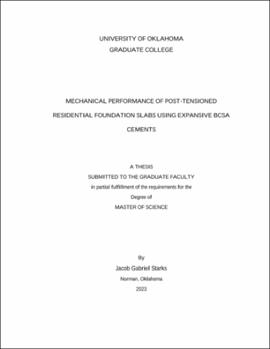| dc.description.abstract | Recent research in concrete materials and structural behavior has focused on alternative cements to increase sustainability as cement manufacturing is a leading producer of CO2 emissions. One promising alternative is calcium sulfoaluminate (CSA) cements. While expansive Type K CSA additives have been used for shrinkage compensating concrete for many years and rapid setting, belitic CSA (BCSA) has found widespread use in pavement repair and precast applications, there has been little research comprehensively analyzing the behavior of CSA cements with both expansive and rapid setting properties.
This research focuses on characterizing the performance of an expansive, rapid setting BCSA cement. This novel cement could be used for post-tensioned slab on grade design that would reducing shrinkage and mitigate prestress losses, resisting the high flexural stresses that result from expansive soil subsurface movements. This can improve the long-term durability and life cycle of these slabs and reduce the magnitude of prestressing forces required for these slabs to resist subsurface movements. Mix designs were developed to provide sufficient workability and working time while achieving sufficient strength at an early age for post- tensioning on the same day, at 6-8 hours after casting. Material properties including elastic modulus, modulus of rupture, restrained and unrestrained expansion, and creep were measured with small scale specimens to establish material properties, and a comparable expansive, non- rapid-setting Type K cement mix was subject to the same tests for comparison. Additional testing was conducted to provide guidance on field curing and retardation procedures. Finally, large-scale post- tensioned slabs were cast with both mixes alongside a conventional portland cement slab, to assess field performance against predictions from measured properties.
Measured mechanical properties show higher strength than those of the conventional portland cement mix design. Considerable strength increases are observed with the expansive BCSA cement as time of wet curing increases, however subsequent drying can reduce these gains. High sensitivity to temperature was observed, requiring greater attention to retardation admixture dosages. Measured values for long-term prestress losses indicate considerably reduced creep and shrinkage behavior, further offset by concrete expansion. Existing ACI 423 models for creep and shrinkage differed greatly from measured values but yielded more accurate estimates with relatively simple adjustment. The large- scale expansive BCSA slab showed agreement with property characterization, exhibiting lower creep and shrinkage than either the Type K or conventional portland cement concrete slabs. | en_US |
